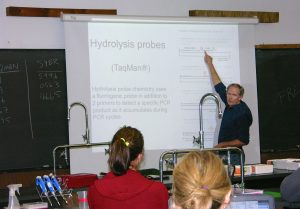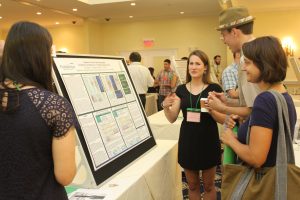In addition to grants to individual faculty members at the Partner institutions to support specific research projects, NH-INBRE also provides a Research Support and Training Grant (RSTG) to each Partner institution and sponsors additional Research Support and Training (RST) activities under leadership of Research Training Core Director Dr. Steve Fiering(Steven.N.Fiering@Dartmouth.edu). The activities and programs occurring at both the Partner and Lead (Dartmouth, UNH) institutions include Undergraduate Research Opportunities at Partner Institutions, Summer Research at Dartmouth through the ISURF Program, including Nursing Research (all described separately), and these additional programs:
Access to shared resources for Partner researchers: A variety of shared resources at Dartmouth and UNH house highly-sophisticated equipment and provide specialized technical support. All Partners have access to these research cores.
Access to Dartmouth libraries for Partners: An essential resource for biomedical research is access to relevant scientific literature. Dartmouth provides access to the Dartmouth libraries and online journal subscriptions for Partners at no cost.
Access to biostatistics: Dartmouth has a biostatistics core resource through the NCCC with PhD biostatisticians focused on
supporting biomedical research design, data analysis and presentation. To support Partner needs, NH-INBRE
is currently supporting a senior biostatistician, to assist INBRE projects.
New Faculty Start-up: NH-INBRE has designed a program to match institutional funding of start-up packages (50:50 match up to $25K) for newly recruited faculty who are serious about conducting biomedical research and whose research interests fit within our themes. This program has been expanded to include existing faculty new to biomedical research activities.
Sabbatical Research Experiences for Community College Faculty: Half-year sabbaticals are available to community college faculty to enable them to work full time in a research lab so they can bring back aspects of their experience to their institution, whether as a continuing collaborator involving their own students, embedding research-related lab components into their courses, or establishing their own research project using the experimental systems and approaches they became familiar with during their sabbatical.
Workshops: Workshops for students and faculty occur at both Partner and Lead institutions. These hands-on, guided small group sessions are typically focused on theoretical and practical aspects of modern experimental approaches and techniques that members of the NH-INBRE network want to incorporate into their research efforts.
Research Seminars: Support is provided for invited speakers from other Partner institutions, the Lead institutions, or institutions outside the NH-INBRE network to talk abut their research. In some cases this has included Nobel laureates who have been invited as speakers for institution-wide symposia and events open to the public.
Postdoctoral Teaching Activities: Working with staff in the Dartmouth Center for the Advancement of Learning (DCAL) trained and prepared Postdoctoral Fellows interested in acquiring teaching experience co-teach courses and lead new, inquiry-based lab modules embedded in courses as a means to help compensate for release time given to NH-INBRE faculty investigators, of infusing courses with up-to-date research expertise, and for increasing the exposure of undergraduate students to young scientific role models actively engaged in research.
Hybrid Research/Teaching Postdoc Program: This program supports postdocs to dedicate 50% of their effort to research, funded by NH-INBRE, and 50% effort to teaching, funded by the Partner. The faculty mentor for these postdocs must have at least 2 yrs. going forward of their own research funding. The hybrid postdoc performs research as does any postdoc
with the mentoring faculty and also helps teach some portion of the course(s) taught by the mentor.
Research- and Inquiry-Based Lab Modules: Newly developed lab modules associated with courses in the life sciences are used to provide undergraduates with additional exposure to modern research techniques and experience with inquiry-based lab activities.
Undergraduate Research Symposia /Career Days at Partner Institutions:
NH-INBRE encourages research symposia at Partner institutions that highlight research efforts of the students at the institution, increase the visibility of research on campus, and provide networking opportunities for student and faculty researchers. Poster and talk sessions often include invited plenary / keynote speakers as well as undergraduate researchers from neighboring Partner institutions.
Atten dance at Scientific Meetings and Research Retreats: Support for travel, accommodations, and registration fees is provided when needed for students and faculty to attend meetings at the state, regional, and national level, as well as for research symposia and more focused research retreats at the Lead institutions. This includes support for attending the NH-INBRE annual statewide meeting, as well as regional and national INBRE and IDeA program meetings. These meetings provide valuable networking opportunities and help keep NH-INBRE researchers abreast of the latest research advances.
dance at Scientific Meetings and Research Retreats: Support for travel, accommodations, and registration fees is provided when needed for students and faculty to attend meetings at the state, regional, and national level, as well as for research symposia and more focused research retreats at the Lead institutions. This includes support for attending the NH-INBRE annual statewide meeting, as well as regional and national INBRE and IDeA program meetings. These meetings provide valuable networking opportunities and help keep NH-INBRE researchers abreast of the latest research advances.
NH-INBRE Used Equipment Exchange and Loan Program: The “NH-INBRE Exchange” involves the exchange and long-term loan of used equipment collected at Dartmouth for distribution to NH-INBRE Partners free of charge. With assistance from the Facilities Office (storage), Machine Shop (minor repairs and re-conditioning) and the Environmental Health and Safety (EHS) Office (certification for safe use), both small and large lab equipment as well as disposable supplies are made available through an online catalog (see NH-INBRE Exchange Catalog) that is periodically updated and expanded.